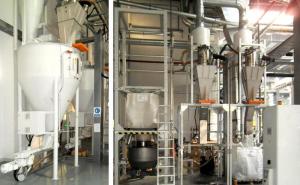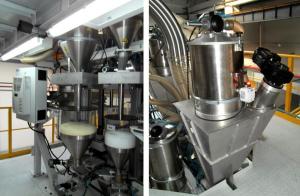Technical Report 2014-03-06
Content shown in the technical articles are the sole opinion and views of the authors or companies, which are not necessarily congruent to opinion and views of the editors.
|
ProTec Polymer Processing realizes material conveyor for TPO production at Benecke Changshun Auto Trim Even challenging regrinds can be reliably processedGrit Feistkorn, ProTec Polymer Processing GmbH At the end of October 2013, Benecke Changshun Auto Trim, a joint venture between Benecke-Kaliko in Hanover and Chinese specialist dealer for automotive plastics Jiangsu Changshun Group, based in Zhangjiagang in eastern China officially put a new production line for interior films made of thermoplastic elastomer based on olefin (TPO) into operation.  In der neu errichteten, 9.000 m2 großen Halle in Zhangjiagang (Bild oben) produziert Benecke-Changshun Auto Trim für den Chinesischen Automobilmarkt hochwertige TPO-Folien, die u. a. für Instrumententafeln, Türverkleidungen und Mittelkonsolen verwendet werden (unten). Die TPO-Folien zeichnen sich durch hohe Alterungsbeständigkeit gegen Licht, Hitze, chemische sowie mechanische Belastungen aus und besitzen zugleich eine exzellente Optik und Haptik.
Bilder: ContiTech, Opel From silo to film extruder, ProTec Polymer Processing designed and implemented all of the material supply equipment for this film production line in Zhangjiagang. In addition to supplying virgin product as specified in the recipe, this system also creates value by returning regrind from the continuous edge trimming that is inevitably created during production and the balls that occur when the process starts up after a change of material back into the process. Since the TPO interior films are up to 50 % lighter than the conventional PVC films that are still often used for this purpose and because the rubbery material tends to stick together, TPO regrind exhibits significantly impaired flow characteristics. As a result, the regrind conveyor had to be equipped with special process controls and plant technology that was adapted to the unique flow characteristics. The film extruder, a twin-screw extruder, is run underfed. Throughput is regulated by the SOMOS® Gramix S9 gravimetric dosing and mixing system fitted above the material feeder. It can handle up to nine components (primary and secondary components in different ratios depending on the recipe). Two of these can be regrind components, which are separated for light and dark regrind types. The extruder is operated with a throughput of up to 800 kg/h; the regrind proportion in this case can be up to 50 %. Regrind handling with interim storage  TPO-Mahlguthandling in doppelter Ausführung, getrennt für helle und dunkle Folientypen: Mischtrichter, um unterschiedliche Mahlgutchargen vor dem Zudosieren am Extrudereinzug homogen zu mischen (Bild links) – Entleer- und Befüllstationen für die Big-Bags (rechts).
Bilder: ProTec Polymer Processing To ensure that the adhesive TPO regrind can be reliably conveyed, the system incorporates several special features – the first of which is the stronger torque specification of the mixing screw in the mixing funnel. The material is also discharged or dosed from the funnel by a discharging screw conveyor before it can then be conveyed by a suction conveyor along pipes to the dosing station. Material is discharged from the big-bag emptying station in the same way. The material supply hopper for the regrind – at ProTec Polymer Processing these are special hoppers with asymmetrical walls – at the dosing station, the mixing funnel and the big-bag filling station were also fitted with loosening agitators to ensure that the regrind, which is extremely light (bulk weight of just 150 g/l) but has a tendency to stick remains free-flowing at all times. Another special feature of the equipment installed to handle regrind is the provision of duplicate mixing funnels, filling, and emptying stations for the big bags: one set for all light and the other for all dark material batches. This enables quick color changes with minimal loss of material. Very high dosing precision, extremely short reaction times  Das gravimetrische Dosier- und Mischsystem SOMOS® Gramix S9 (Bild links) regelt neben der Mischungszusammensetzung auch den Durchsatz des Extruders. Um das extrem leichte und klebrige Mahlgut rieselfähig zu halten, sind die asymmetrischen Vorratsbehälter hierfür (Bild rechts) zusätzlich mit einem Auflockerungsrührwerk ausgestattet.
Bilder: ProTec Polymer Processing The dosing system features convenient operation via touch-screen display and offers diverse display and evaluation functions. Current process states in the dosing system can be intuitively detected while any outages and faults are indicated in clear text. The Gramix controller also automatically detects the dosing screws used in the individual dosing stations. If a screw is changed, for example, to increase the throughput, the correction of dosing values takes just a few seconds. This avoids mistakes in the composition of the mixture. Über Benecke-Kalliko Benecke-Kaliko AG is based in Hanover and is part of the ContiTech Group. With its core expertise in the area of web material for motor vehicles, Benecke-Kaliko produces at four locations and employs over 1700 people. In 2012, the company generated sales of 357 million euros. ContiTech AG, a division of Continental AG, Hanover, is one of the world's leading suppliers of technical elastomer products and a specialist in the field of plastic technology. It develops and produces functional parts, components and systems for the automotive industry and other important industries. ContiTech employs a total of some 29,500 people and generated sales of approximately 3.7 billion euros in 2012. ProTec Polymer Processing GmbH ProTec Polymer Processing GmbH with its headquarters in Bensheim combines the renowned brands SOMOS® and OHL as well as the new brand ProTecTrusion: Machines and complete system solutions for efficient material handling in all plastic treatment processes currently in use as well as machines for solid matter post-condensation of plastics and turn-key plants for bottle-to-bottle recycling of PET and plants for producing LFT pellets. ProTec Polymer Processing is a member of the Schoeller Polymer Industries group of companies (www.schoellerpolymerindustries.com). The inclusion in the global sales and service network of the Schoeller Group (www.schoeller.org) provides the optimal infrastructure for comprehensive on-site customer service. ProTec Polymer Processing GmbH Stubenwald-Allee 9 Phone: +49 (0) 6251 77061-0 Internet: www.sp-protec.com |
 back to the list back to the list |  back to top back to top |



